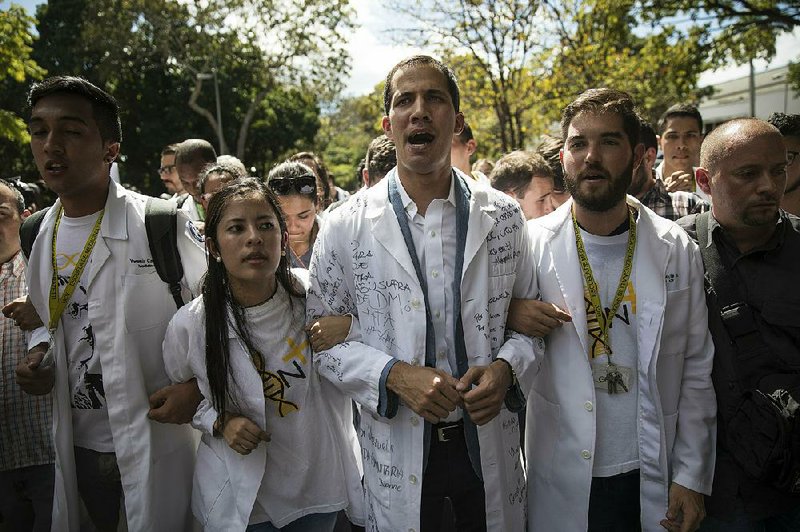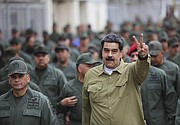CARACAS, Venezuela -- Doctors in scrubs, businessmen in suits and construction workers in jeans gathered on the streets of Venezuela's capital Wednesday, waving their nation's flag and demanding Nicolas Maduro step down from power in a walkout organized by the nation's reinvigorated opposition to ratchet up pressure on the embattled president.
Protesters said they were heeding the opposition's call for another mass demonstration despite the heavy-handed response by security forces over the past week to quell anti-government protests.
"I'm going out now more than ever," said Sobeia Gonzalez, 63. "We have a lot more faith that this government has very little time left."
The latest walkout comes a week after opposition leader Juan Guaido proclaimed himself the nation's rightful president amid a sea of supporters, hurling the nation into a new chapter of political tumult as the anti-Maduro movement tries to establish a transitional government and the socialist leader clings to power.
"We are staying in the streets," Guaido told students at a surprise appearance at the Central University of Venezuela. "Not just in protest of the crisis we are living in all of Venezuela, not just because of how bad things are, but also for the future."
The 35-year-old lawmaker has transformed from a little-known opposition figure into a commanding force in the nation's politics with the backing of U.S. President Donald Trump and two dozen other nations recognizing him as Venezuela's interim president.
The turmoil has morphed into a larger geopolitical standoff as Maduro accuses the U.S. of orchestrating a coup by backing Guaido and enacting punishing oil sanctions, while Venezuelan allies China and Russia continue to stand by Maduro.
On Tuesday, the government-stacked Supreme Court barred Guaido from leaving the country and froze his bank accounts as a probe into his anti-government activities led by Maduro ally and chief prosecutor Tarek William Saab advances. U.S. national security adviser John Bolton warned that if Guaido is harmed, then Venezuela will face "serious consequences."
Guaido has thus far managed to avoid arrest, and the Supreme Court did not strip him of his legislative immunity, though the new investigation could signal that Maduro's administration is moving to take a more punitive approach in the days ahead.
Maduro huddled Wednesday with troops, prayed with evangelical supporters and released a video urging the American people to rise up against Trump and support Maduro as Venezuela's rightful leader. He said Trump has his eyes on Venezuela's vast oil reserves and warned against any U.S. military intervention.
"We won't allow a Vietnam in Latin America," Maduro said. "If the aim of the United States is to invade, they'll have a Vietnam worse than can be imagined."
Maduro has been overseeing military training exercises broadcast on state television on a near-daily basis over the past week in an apparent attempt to show he still has the backing of the armed forces, whose support is key to either man's claim to the presidency.
In an interview with Russia's state-owned RIA Novosti news agency, Maduro said he was "willing to sit down for talks with the opposition for the sake of Venezuela's peace and its future," an offer he has repeated often but that the opposition is reluctant to accept. He also accused Trump of ordering a hit on him from Colombia but offered no proof.
The already distressed nation is likely to face even tougher times after the U.S. imposed sanctions Monday on Venezuela's state-owned oil company, potentially depriving the Maduro government of $11 billion in export revenue over the next year.
Maduro called the sanctions "criminal" and vowed to challenge the U.S. in court.
Violent street demonstrations broke out last week after Guaido declared during an opposition rally in Caracas that he had assumed presidential powers under the constitution and planned to hold fresh elections to end Maduro's "dictatorship."
Under Venezuela's constitution, the head of the National Assembly is empowered to take on the duties of the chief executive under a variety of circumstances in which the presidency is vacated. The opposition contends that Maduro's re-election was a sham because, among other things, top opposition candidates were barred from running. The opposition says his new second term is therefore illegitimate.
The U.N. human-rights office said security forces in Venezuela detained nearly 700 people in just one day of anti-government protests last week -- the highest such tally in a single day in the country in at least 20 years -- and that more than 40 people were killed.
Maduro's allies blame the opposition for the violence and deny the high death toll as well as reports that minors were among those arrested.
Information for this article was contributed by Fabiola Sanchez and Manuel Rueda of The Associated Press.
A Section on 01/31/2019

